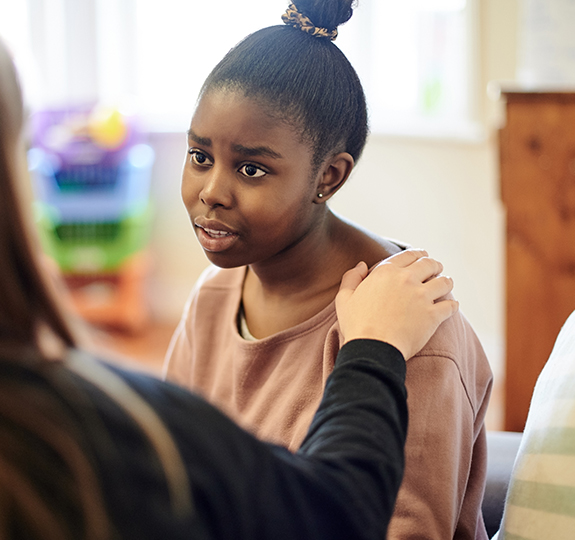At Phase Homes, our therapeutic approach is founded on understanding how trauma affects children's development and behaviour. We recognize that many children in care have experienced adverse childhood experiences that impact how they view themselves, others, and the world around them.
Our practice is guided by the PACE model (Playfulness, Acceptance, Curiosity, and Empathy), which helps create emotional safety in our interactions with young people.
This approach supports children to:
Our practice is guided by the PACE model (Playfulness, Acceptance, Curiosity, and Empathy), which helps create emotional safety in our interactions with young people.
This approach supports children to:
- Develop trust in adults and form secure attachments
- Understand and manage their emotions in healthy ways
- Build resilience and coping skills
- Develop positive self-identity and self-worth
- Form healthy relationships with peers and adults
Our staff receives specialised training in trauma-informed care, enabling them to understand that challenging behaviours are often adaptive responses to adverse experiences rather than deliberate misbehaviour.
Instead of asking “What’s wrong with you?” we ask “What happened to you?” and “What do you need?”
In practice, this means we:
- Provide consistent, nurturing relationships
- Create predictable routines that help children feel safe
- Respond to behaviours with understanding rather than punishment
- Work collaboratively with children to solve problems
- Use restorative approaches to repair relationships when things go wrong

Six Principles of Trauma-Informed Practice
Our practice is guided by six core principles that inform how we work with children who have experienced trauma:
Safety
We prioritize the physical and psychological safety of children and staff by creating environments where people feel secure and can express their needs without fear.
Trust
We build trusting relationships through transparency, consistency, and honesty. We do what we say we will do and make our expectations clear.
Choice
We support children in shared decision-making and goal setting, acknowledging that those who have experienced trauma may feel a lack of control in their lives.
Empowerment
We share power with children and give them a voice in decisions that affect them, validating their feelings and concerns and supporting them to make choices.
Cultural Consideration
We recognize and respect diversity in all forms, offering culturally responsive care that acknowledges the impact of historical inequality and discrimination.
Collaboration
We value children's experiences and work alongside them to overcome challenges, using both formal and informal peer support.

Safeguarding
Safeguarding children is our highest priority. All children have the right to be protected and to live in an environment free from abuse and other forms of significant harm.
Our safeguarding practices include:
Our safeguarding practices include:
- Comprehensive staff training in safeguarding, Child Sexual & Criminal Exploitation awareness, cyber safety, and managing allegations
- Clear reporting procedures for any concerns
- Close collaboration with Local Authorities and safeguarding partners
- Regular reviews of our safeguarding policies and procedures
- A Designated Safeguarding Lead who oversees all safeguarding matters
We have robust procedures in place for managing situations where children may go missing, recognizing that when this occurs, they are particularly vulnerable. Our response focuses on ensuring children’s safety while addressing the underlying reasons for their behaviour.
Behaviour Support
At Phase Homes, we understand that behaviour is a form of communication, often expressing underlying needs, feelings, or experiences. Our approach to supporting positive behaviour is based on building strong relationships with each child and understanding them as unique individuals.
We believe that children need boundaries to feel safe and cared about. Boundaries work best when applied in an understandable, fair, and consistent manner. We involve children in making choices about their care and daily activities, which contributes to their sense of self-worth and enhances positive behaviour.
Our approach includes:
We believe that children need boundaries to feel safe and cared about. Boundaries work best when applied in an understandable, fair, and consistent manner. We involve children in making choices about their care and daily activities, which contributes to their sense of self-worth and enhances positive behaviour.
Our approach includes:
- Providing positive reinforcement and unconditional positive regard
- Using restorative approaches when relationships are harmed
- Working with children to understand the impact of their behaviour
- Teaching emotional regulation skills
- Using the Antecedent-Behaviour-Consequence (ABC) framework to understand behavioural triggers


Risk Management
Our approach to risk management balances the need to keep children safe with the importance of allowing appropriate opportunities for growth, exploration, and development of independence.
We conduct thorough risk assessments for each child, considering their individual needs, strengths, and challenges. These assessments inform individual working with management plans that detail specific methods for supporting each child.
Rather than being risk-averse, we take a creative approach to enabling children to participate in activities that support their development while managing risks appropriately.
This includes:
We conduct thorough risk assessments for each child, considering their individual needs, strengths, and challenges. These assessments inform individual working with management plans that detail specific methods for supporting each child.
Rather than being risk-averse, we take a creative approach to enabling children to participate in activities that support their development while managing risks appropriately.
This includes:
- Involving children in identifying and managing risks
- Using graduated exposure to help children build skills and confidence
- Providing appropriate supervision based on individual needs
- Regularly reviewing and updating risk assessments as children develop
